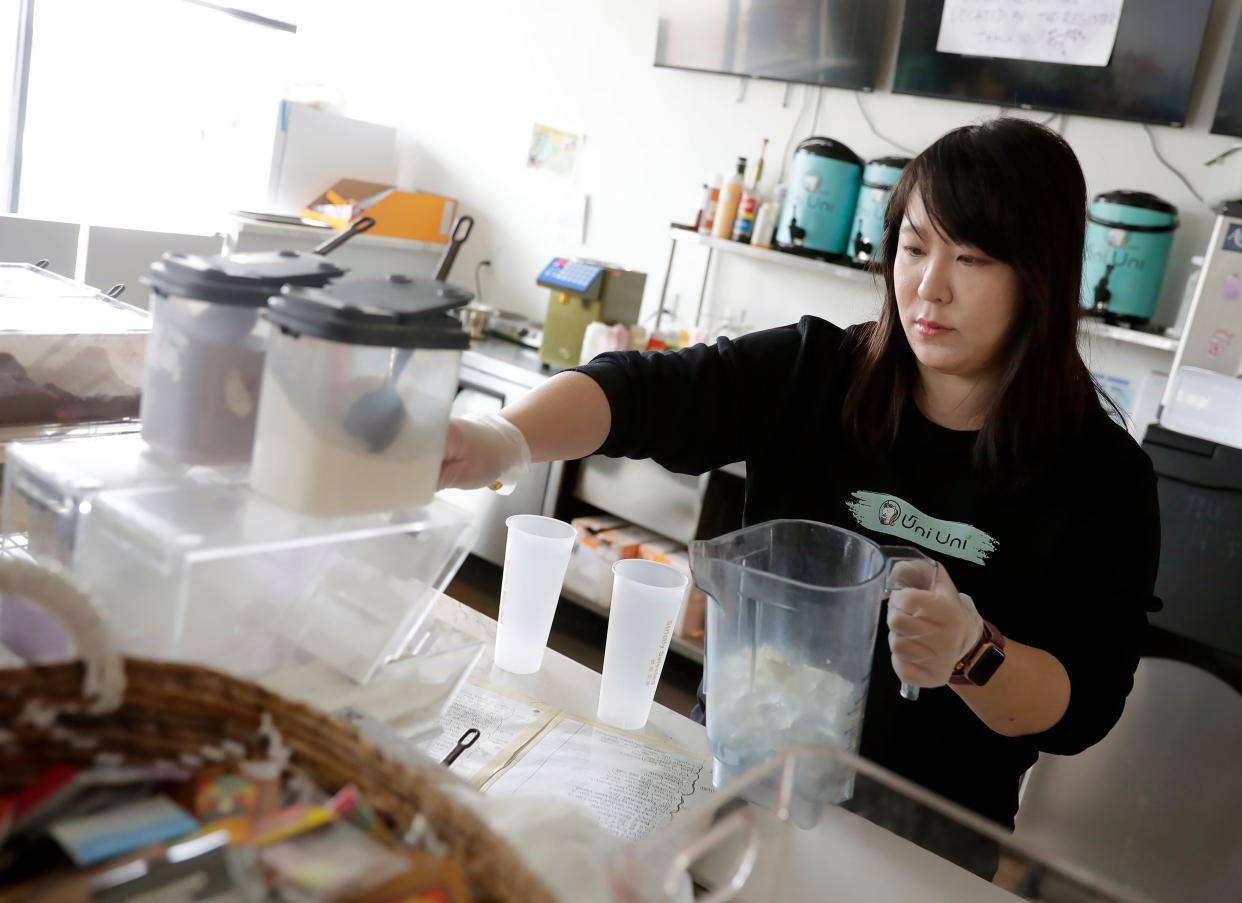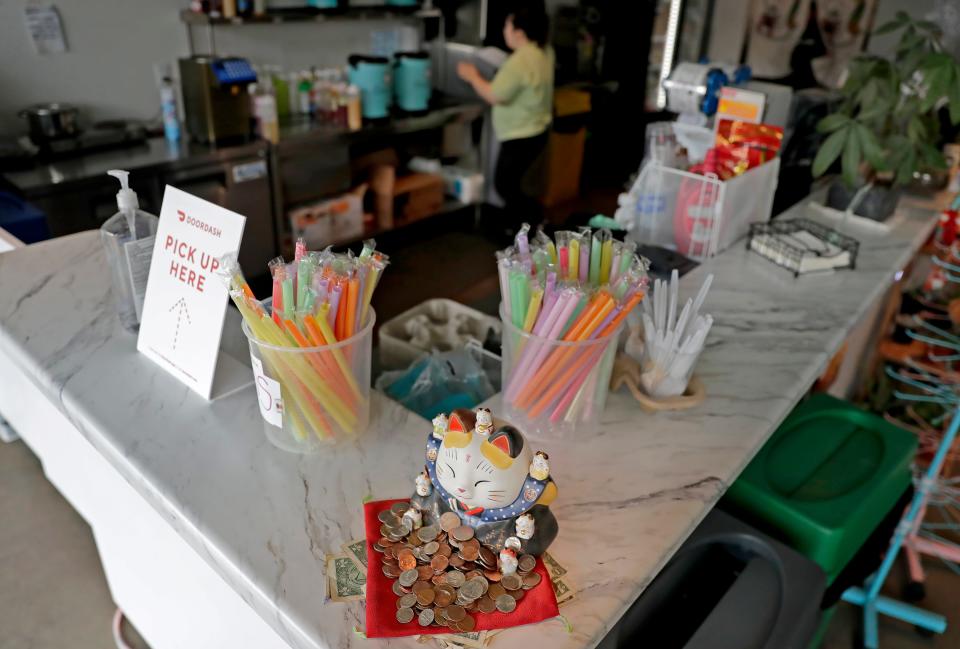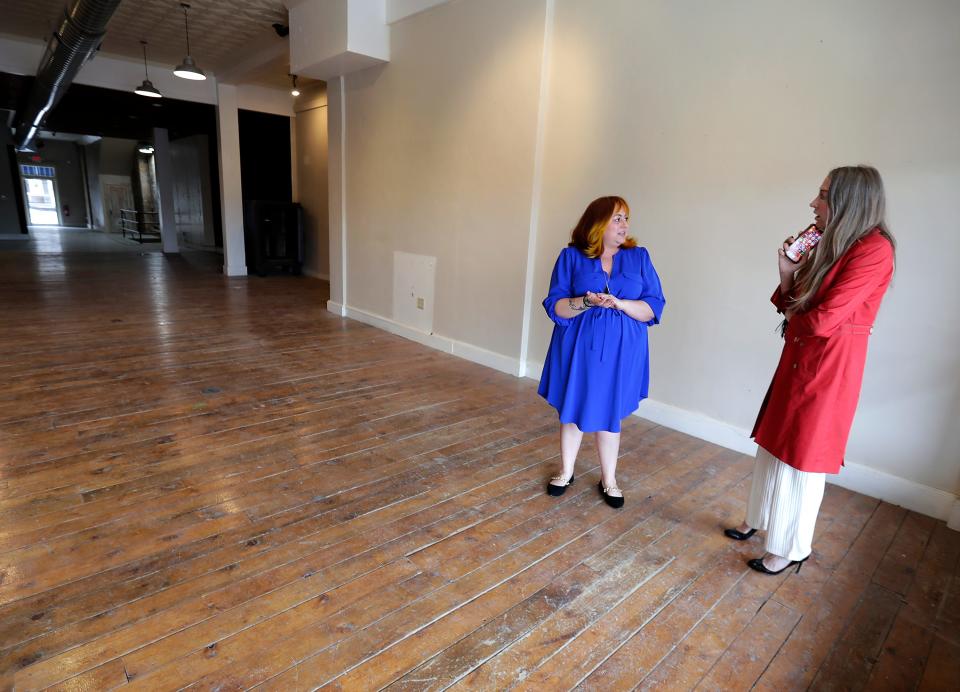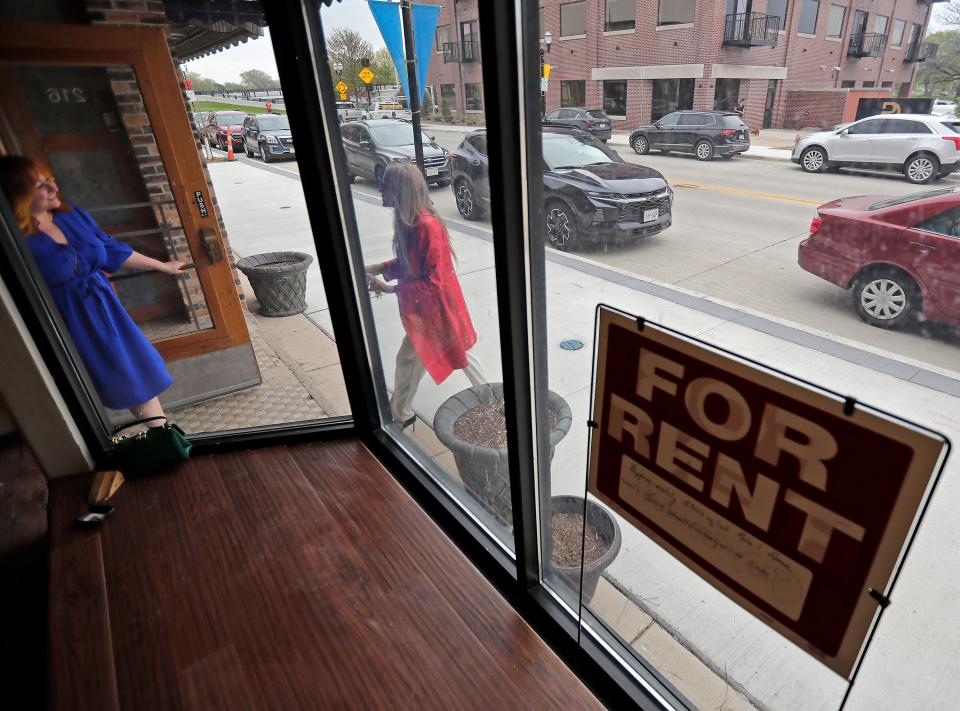Without this corporation, Appleton might've not met Uni Uni Bubble Tea. Here's how they helped

APPLETON – In 2021, Fannie Xie visited 10 different banks to propose her business plan for Uni Uni Bubble Tea. She said although her plan was solid and had been praised by many of the bankers she visited, her loan request was still rejected by every single one.
"I didn't have any collateral, I didn't have any business experiences and bubble tea is something new in the area," Xie said. "None of the bankers I talked to knew what bubble tea was, and 'new' means 'risky' for them."
With no where to turn, Xie decided her best option would be to try Wisconsin Women's Business Initiative Corporation, which she learned about while taking a beginner's business class at Fox Valley Technical College.
Because the loan Xie asked for was slightly larger than the loans they're used to giving out, she had to present her business plan to a committee of WWBIC members first.
"On the day of the presentation, as a minority, I just felt more comfortable to talk to that committee," Xie said. "I saw a variety of race, sex and identity at the table, so I was comfortable presenting my idea."
WWBIC, a statewide economic development corporation, has been assisting businesses, especially women-owned ones, since 1987. The goal of the organization is to provide underserved individuals with goals of starting or expanding their businesses with resources to help them do so.
The corporation's focus is mainly aimed towards those who face barriers when trying to access traditional financing resources, like women, people of color, veterans, rural and lower income individuals.
Xie, a woman, veteran and member of a minority population, was approved for her loan and, within five months of receiving her funds, was finally able to open Uni Uni Bubble Tea at 823 W. College Ave., Suite B, in Appleton.

"I'm glad there's agencies like WWBIC that exist in the community, otherwise I would never be able to open this shop," Xie said. "No bank would ever loan to me as a startup during COVID times for something so new."
While WWBIC has been around for 35 years, the Appleton location, 1191 N. Casaloma Drive, has only been open for four.
Colleen Bies, the northeast regional project director for WWBIC based out of Appleton, said they want to provide more help to businesses in the area.
"It's hard to even say we've been open for four years because nobody knows about us because we spent three of those four years in pandemic and post-pandemic," Bies said. "This feels like the first year that we're able to really help business owners and share what we do."
According to a 2019 report from the U.S. Small Business Administration, small businesses generate 44% of the United States' economy, equivalent to creating two-thirds of the new jobs across the nation.
WWBIC Appleton's goal is to continue working with women and minorities to ensure the success of small businesses throughout Outagamie County.
The organization offers a number of different means of assistance so that other business owners might have the same success stories as Xie.
How does WWBIC help small businesses?
Out of their statewide client list, 69% of businesses WWBIC works with are women-owned, according to its 2023 impact report.
"We have two main things that we focus on; we educate and train small business owners who want to either start, maintain or grow their business," Bies said. "We do that in the form of workshops and classes that we offer for free to our clients."
Along with classes and workshops, WWBIC also provides small business loans to those who might find it difficult to get one at other financial institutions.
"Most likely, as a small business owner, you're going to get denied a small business loan because you have no credit, you're a brand new business, you're a startup or you're in a risky field that they don't think will generate enough money to be able to pay back loans," Bies said.
Bies said in these cases, WWBIC is more lenient and able to approve higher-risk loans.

In 2022, WWBIC's Appleton location assisted 61 female business owners across Outagamie County, and more than 700 people statewide. Its website states it has loaned over $90 million statewide since its inception.
Across Wisconsin, 69% of the people that were able to get a loan through WWBIC remained in business after five years, Bies said.
"We're trying to keep women business owners in business," Bies said. "We're trying to keep them with their doors open for the support of our community in general."
The organization also gives clients many opportunities to market themselves, as Xie can attest to.
"I was invited to their committee to speak about my experience before," she said. "That shows me they are always listening to their clients and they care about us."
What classes does WWBIC offer?
Clients of WWBIC can sign-up to attend any of the more than 400 classes and seminars hosted throughout the year through the corporation's website, wwbic.com. Class topics include starting or maintaining a businesses, managing finances and more.
"We have a core curriculum called 'So, You Want to Start a Business?' and that's like our introductory class," Bies said. "We're educating someone on what it takes to become a business owner, what it takes to start a business and the risks that come with it."
Another class, "Cashflow, Cashflow, Cashflow," gives attendees an understanding of how cash moves through their businesses and how they can succeed.
"No one starts a business because they're like 'I love accounting and reporting,'" Bies said. "This class really helps break it down to say, 'You might not love this, but you need to like it enough to understand it,' because it's such a vital part of whether your business succeeds or fails."
Women business owners can complete a course to become certified as a Women Owned Business Enterprise (WBE) through WWBIC. Bies said this certification can be beneficial to small businesses that want to work with bigger organizations or government agencies.

"Sometimes those organizations and municipalities will prioritize you as a small business if you're certified as either minority business enterprise or women business enterprise," Bies said.
Most of the classes are free to clients, but some of the more extensive classes come with a price.
"We do have a really in-depth class called 'Start, Run, Grow' and that is one of our very few fee-based classes," Bies said. "It's $225 for the class, but that's only because it's like a master's level course."
Most classes can be attended in person and virtually. A full schedule of classes with information on each can be found on WWBIC's website.
There's no cost for being a WWBIC client
It is free to be a WWBIC client, and those interested in joining only have to fill out a demographic information form.
Those in Outagamie County and surrounding areas should call or visit the WWBIC Appleton location to speak with a staff member for further information.
WWBIC has six locations throughout the state: Milwaukee, Kenosha, Racine, Appleton, Madison and La Crosse.
Bies encourages anyone, especially women and minorities, who want to start a business, already own a business, or even those who don't even know where to start when it comes to owning a business to turn to WWBIC for assistance.
More: Valley New School might need a new home, but there are still many unknowns. Here's what we know.
More: A Mequon-based developer made another offer on Shattuck property. Then the district asked for triple
"Thirty-five years ago, women were not allowed to get a loan without a man signed on to her loan, so because of that, WWBIC created this ability to provide loans to women," Bies said.
From there, the organization has been able to provide most of their clients with business loans.
WWBIC ensures the success of its clients' businesses by not only lending them loans but making sure they have the tools and education to succeed with their classes and workshops. For more information, visit wwbic.com.
Reach Jelissa Burns at 920-226-4241 or jburns1@gannett.com. Follow her on Twitter at @burns_jelissa or on Instagram at burns_jelissa.
This article originally appeared on Appleton Post-Crescent: Wisconsin Women's Business Initiative Corp. helps Appleton businesses

